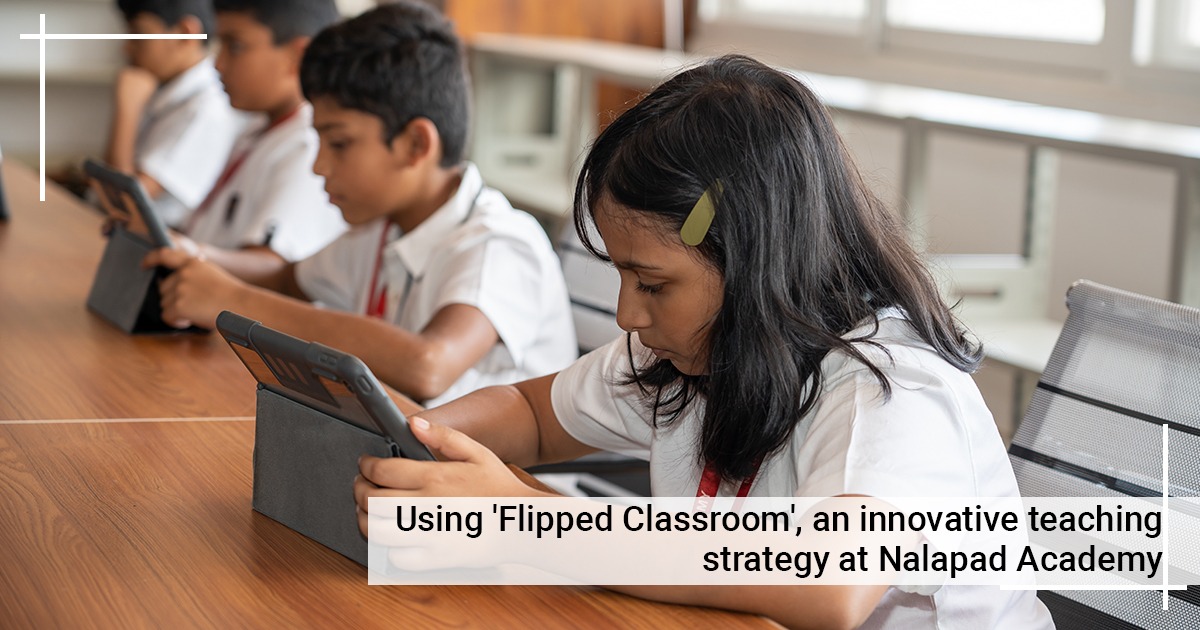Using ‘Flipped Classroom’, an innovative teaching strategy at Nalapad Academy

The flipped classroom was originally introduced as a new pedagogical approach in 1984, Russia where students were asked to read their books autonomously and extract new lessons that were then proposed as a premise for the classroom discussion that followed. Films like Dead Poets Society have amplified the essence of a similar approach, to reiterate the benefits of a learner-centred model. With time, the flipped classroom model has gained momentum to appeal to many who have both formally and informally, employed renditions of the same over the last two decades.
The flipped classroom is now popularly used by educators who achieve to impart holistic lessons to their students and technological advances as they have become teaching aids today, are an intrinsic part of what has become of the flipped classroom model today.
What is the Flipped Classroom Approach?
Unlike the traditional classroom setting where the medium of instruction and therefore the one who sets the pace for a class has been identified with the facilitators, the flipped classroom achieves to establish a classroom setting that shifts the role of setting the course of the given class, to the students present in the classroom.
Growing Appreciation for the Flipped Classroom
The flipped classroom has been gaining appreciation to further see reflections of its renditions in use across schools universally. Although some see limitations in the approach, the larger sense of acceptance to the module is unmistakable. This could be attributed to the novelty in the flipped classroom model and the benefits that both teachers and students have experienced in the same –
- Room for Everything that Can Benefit the Class – In Nalapad Academy, flipped classrooms are open which gives an opportunity for the students and facilitators to explore and learn by setting realistic goals using various teaching and learning tools. We design our learning engagements wherein students indulge creatively with the help of technological tools designed to aid classrooms that facilitate the process of learning. For example, audio – visual tools such as powerpoint presentations, videos, podcasts and proactive conversational discussions, etc. helps the students to learn and grow. Students are allowed to use the online class option when they are unable to attend physical school. They can log in from wherever they are.
- Indulgence in Brainstorm – Students are divided into groups by using various grouping strategies so that they can have the opportunity to interact and brainstorm their ideas and thoughts with various peer groups. Students will experience the benefits of engaging in learning through healthy discourses as they lead to building a team spirit. This is seen very often in our Global Perspectives and language classes.
- Expression and Communication – At Nalapad Academy, our students are encouraged to initiate a dialogue about relevant real-life happenings that they have read about and engage in a healthy conversation about the same in their academic lessons as well. The classroom is set up to include interactive activities where every student is encouraged to actively participate in the discussions and activities that unfold in the class while the facilitator assumes the role of being an aid when the need arises. We conduct activities like JAM sessions and Debates, we organise Show and Tell on different topics which encourages our primary and middle school students to shed their inhibitions and develop their expression and communication. We recently conducted an inter-house competition wherein our students in their house groups had to plan and present a skit in 60 minutes. The skills obtained during this process, promises a path of easy social interactions alongside confidence in the self.
- Emphasis on Responsibility and Accountability – As students are asked to prepare for their classroom interactions where they are not reprimanded for their mistakes as much as they are nudged to error correction, they are given an opportunity to understand and further take responsibility for their choices made. The sense of accountability as it is positively reinforced in the face of a task completed, lends itself to letting students cultivate a healthy sense of competence. At Nalapad Academy we don’t believe in giving home-work to our students. In fact, they are encouraged to finish their assignments at school during the mentoring time.
Previous

